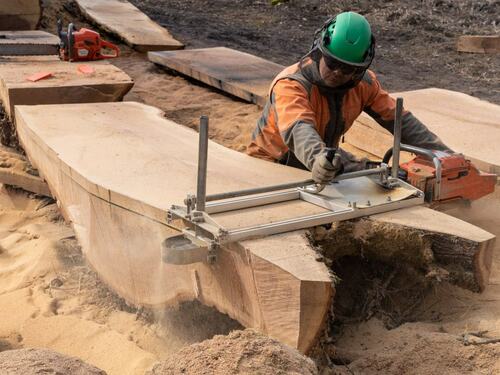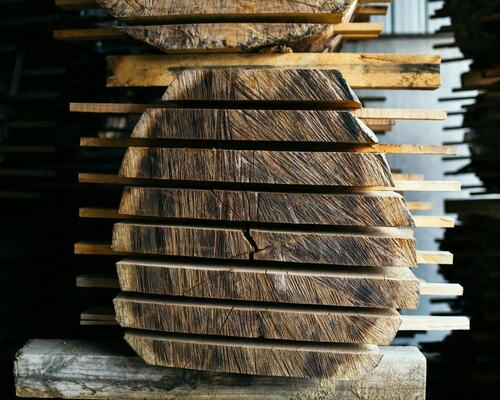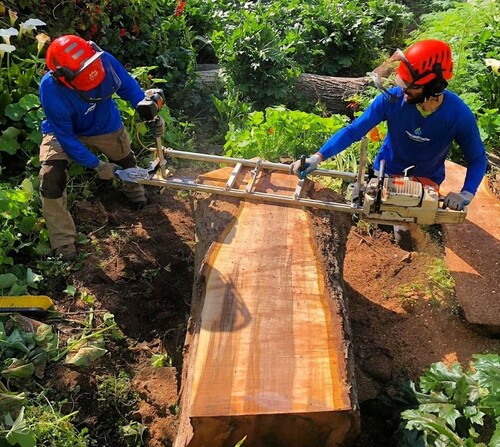10 Reasons to Invest in a Portable Sawmill
Introduction
If you’re a builder or woodworker, how cool would it be to have complete control over your wood materials from the moment when a tree is cut down? You don’t have to choose boards from an often picked-over pile at the retailer, and you don’t have to pay retail prices. You just need a portable sawmill .
Portable sawmills make the first stage of processing wood accessible. Landowners, woodworkers, and others can mill their own lumber on-site, whether from trees on the land or logs that were felled elsewhere. Whether you’re a hobbyist or a beginning professional, there are several good reasons to invest in a portable sawmill.
Benefits of Owning a Portable Sawmill:
- Economic benefits from cost savings and potential income
- Versatile options for milling custom boards
- Education from hands-on learning
- Self-reliance for supply and quality
- More advantages
1. Cost-Effective Lumber Production

High-Quality Milled Boards – Photo by Marissa Daeger on Unsplash
Many woodworkers and builders initially get a portable sawmill because of the cost savings that a sawmill provides.
DIY lumber milling eliminates the markups that mills and retailers place on wood. Those markups have spiked in recent years. Although lumber prices have fallen some since their spikes during the Covid pandemic, they still can rise significantly. Per ResourceWise’s data, lumber prices were rising in the latter part of 2023, and that trend has continued into 2024.
The cost of lumber can be especially painful when working with hardwoods. Hardwood prices vary by species, location, and board, but they aren’t cheap anywhere.
The initial investment in a portable sawmill might seem expensive compared to the cost of wood. If you regularly work with pricey hardwoods, though, the lumber savings you’ll realize could more than pay for the sawmill fairly quickly.
You could cut down your own hardwood logs or trade milling for lumber. Many landowners and sawyers that do this find that 1-3 boards per log milled is a reasonable barter, and you can often take the choice boards if you’re the one milling.
2. Versatility and Portability
For the hobbyist or small business owner, a portable sawmill is the perfect size. Most models can be moved by either truck or ATV, and smaller ones might even be moved short distances manually (sometimes with help).
Such portability provides versatility. If you have a sizeable acreage, you can bring the sawmill to different locations on your property. You also can take it to different properties should you want to mill for others or at multiple project sites. For your own property, it’s often easier to relocate boards once milled rather than to freight large logs to where you need them.
3. Customization Options
When you mill your own lumber, you aren’t limited to just the standard lengths that larger mills process. Custom milling capabilities let you make almost any boards you need. While you’ll likely make mostly 1- and 2-inch boards, you can cut them much thicker or wider as need. This is especially true if you need beams, headers, posts, or other larger pieces.
Just be sure you allow plenty of time for thicker boards to dry, especially if you’re milling 4×4 or thicker beams. My preference is to use a moisture meter to check moisture content rather than relying the old adage that you need one year per inch.
For Fine Woodworking
If you do fine woodworking, custom cutting also lets you plan around wood grain. You can make specific cuts around the most figured sections of a log, and you can cut quartersawn boards for non-feature parts. The combination is perfect for stability, strength, and furniture that’ll stand out.
4. Environmental Benefits

A Portable Sawmill in Use on a Fallen Tree
The first reason for purchasing a portable sawmill typically isn’t the environmental benefits that these mills have. Nonetheless, they are one of the most eco-friendly wood processing tools.
Removing Carbon and Responsibly Managing Trees
Processing local trees and logs reduces transportation and the associated carbon emissions. You’re also able to process trees that have fallen naturally or must be removed for safety. There are fewer greenhouse gases in the air and fewer trees being cut that wouldn’t otherwise come down.
Part of woodworking and homesteading is honoring the trees that you use. What better way is there to honor a tree than to responsibly process one that has fallen or would be taken down anyway?
5. Income Generation Potential
For entrepreneurs, a portable sawmill can lead to a small business or side hustle. You can earn some extra income by selling wood that you process and by offering on-site lumber production in the local area.
Selling Milled Lumber
Selling your own lumber can yield a tidy income if you focus on hardwoods like walnut, cherry, oak, or ash. If you have access to exotic domestic species, such as apple or swamp sycamore, you can charge an even higher premium price.
Sometimes it can take a little while to gain traction in the local community. You could have a steady stream of customers once woodworkers, cabinet makers, and furniture makers in the area know they can get special hardwoods from you. For example, one portable sawmill owner has grown his business so that he’s using eleven buildings to process and store wood.
According to Clint Stewart, one of our milling specialists, “From one milled cherry tree, I’ve successfully sold the larger boards for $60-80 each, and customers tend to be quite pleased if you simply throw in an offcut free of charge.”
6. Quality Control
When you process your own lumber, you have complete control over the quality and grade of the wood. Choose the best logs, and then select the best boards from what you mill. After milling, you also have complete control over the drying process.
There’s no reason to settle for boards that are less than optimal either in appearance or condition. You control every aspect of the board’s quality—and that means you have the right raw materials for making some stunning furniture or other projects.
7. Reduced Waste

Unique, Low-waste Custom-Milled Boards – Photo by Sarah Worth on Unsplash
Custom milling not only lets you process boards according to your needs but also according to the logs that you’re working with. Plan cuts so that they make full use of the tree. You’ll get the most board feet from every log and have fewer waste boards for the firewood pile.
Reducing waste is good for the environment, provides you with maximum yield, and lessens how much waste wood you have to dispose of.
8. Educational Value
If you want to learn about processing wood before it’s in the workshop, operating a portable sawmill offers a hands-on education. You’ll learn more about wood properties, milling techniques, and sustainable forestry practices.
The education you gain will at least be interesting. It’ll likely also make you a more responsible landowner and a better woodworker, too.
9. Self-Sufficiency
Recent years have shown that the lumber industry isn’t immune to potential issues. Rising prices can make projects much more expensive than estimated, and sometimes it’s not easy to source the exact wood you need.
Owning a portable sawmill makes you much less reliant on lumber suppliers for your projects. You’ll be able to afford the wood needed for projects, and you’ll have that wood even if others can’t find it. In fact, you might be who they come to for specific woods if others nearby aren’t currently selling it.
10. Preservation of Heritage Trees
If you have sentimental or historical trees on your property, a portable sawmill can help you preserve their legacy. By milling the wood, you can create lasting keepsakes, furniture, or other items that honor the tree’s significance. A tree’s wood can be honored even after the tree itself falls.
Learn More About the Milling Process

Arborist Now Experts Milling a Fallen Tree
There are many reasons to own a portable sawmill, ranging from the economic to the emotional. We at Arborist Now certainly appreciate the satisfaction, education, and cost-effectiveness that milling boards provides. We’d be happy to talk with you about the milling process and what running a mill is like, or we can mill your logs if you don’t yet have a portable sawmill. If you’re in the Bay Area, get in touch and talk with one of our milling experts.
How much does a portable sawmill cost?
New portable sawmills are affordable for most landowners’ and woodworkers’ budgets. Models are available for just a few thousand dollars, with more premium models still available for less than many used cars today.
What costs are involved in operating a sawmill business?
Operating a sawmill business is a low-cost endeavor, but there are some expenses to plan for. The main ones are replacement saw blades, fuel, and occasional maintenance. Many sawmill owners maintain their sawmills themselves. The other major cost is sourcing logs if you don’t have any on your property, and you’ll need space to store and dry processed boards.
What maintenance do portable sawmills require?
Maintenance generally includes regular blade sharpening and replacement, checking and adjusting belts and chains, lubricating moving parts, and ensuring the engine or motor is in good condition. Frequency and specifics depend on usage and the manufacturer’s recommendations.
With a manufacturer’s instructions and online videos, there are plenty of resources for learning how to maintain a portable sawmill.
What types of blades do portable sawmills use?
Portable sawmills usually use either oversized chainsaw or oversized bandsaw blades. Cheaper models may use a chainsaw or chainsaw blade. Bandsaw blades produce less waste sawdust, allow for higher yields, and are the standard on most models except for the lowest-priced ones.
What’s the ROI (Return on Investment) of portable sawmills?
A portable sawmill’s profitability depends on many factors. How much it’s used, what type of wood is processed, and what processed wood is used for (personal use or selling) are just a few of the factors that impact potential profits. Because these are so affordable, however, it doesn’t take much to have a positive ROI.
We may receive affiliate compensation for some of the links below at no cost to you if you decide to make a purchase.



